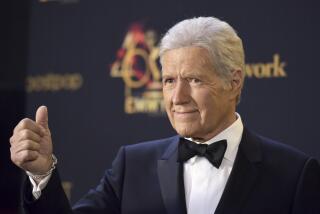King for a Day in the Geeky Realm of Televised Trivia
- Share via
I am a “Jeopardy” junkie. I have faithfully watched the TV game show in all of its incarnations for the last 40 years, shouting out the answers to the TV screen.
When I was in medical school, I would make up “Jeopardy”-style questions to help study for exams. I always felt I could be competitive on the show if only given a chance.
I am not alone. We Jeopardites are all around you -- the Mr. Smarty Pants in your high school chemistry lab, the know-it-all on the debating team. For us, “Jeopardy” is the mecca of trivia -- although the show’s producers would prefer you to call it “acquired knowledge.”
To the true believer, “Jeopardy” isn’t just a game show. There is an Internet community of former contestants, aspirants and aficionados who meet daily to summarize, analyze, annotate and deconstruct each broadcast. Contestant responses are parsed and second-guessed. Every clue is scrutinized and decoded for internal consistency.
My day of destiny came in early January. It was the call -- or as it’s more reverently known among Jeopardites, the call. It was Bob, one of the contestant coordinators, asking if I would like to be on TV. Well yeah, about as much as I would like to continue breathing oxygen. This was a dream come true.
The road to an actual spot as a “Jeopardy” contestant is a difficult one. The process starts with a 50-question test of general knowledge read by Alex Trebek on video.
Candidates who pass the test are invited to stay to play a mock game against each other. This is followed by the all-important interview with the contestant coordinators.
The coordinators are looking for players with personality. In this area, I’m slightly challenged. I’m a neurologist, you see, and we are, as a group, not exactly the Robin Williamses of the medical profession. Unlike Elvis, when I leave the building, no one notices.
On two previous occasions, I had passed the written test and gotten as far as the interview stage. This time, I knew I needed a hook, something unique to get the staff’s attention. I released my inner ham. “Oh, I do an impression of Elmer Fudd doing his impression of Ben Stein.”
“Let’s hear it.” I did the shtick, and though I sound nothing like Fudd or Stein, they seemed impressed. The coordinator made a note of my special ability and I left feeling certain that I was in.
Then began the wait.
“What we anticipate seldom occurs,” cautioned Disraeli. “The waiting,” observed Tom Petty, no more comfortingly, “is the hardest part.”
Which brings us to that fateful day in January when I passed my tests. Years of preparation didn’t seem enough; I had to cram as much more information as possible into my brain. I turned to that great Bible of geekdom, the World Almanac.
I reviewed Sana, Agana, Havana, Manama -- the world capitals that every “Jeopardy” contestant must know. Other categories that frequently appear are U.S. presidents, opera, Shakespeare, religions and literature. I tried to devote study time to each. Suddenly, I realized that I was going to be on national TV in front of millions of people and I didn’t know diddly. When the actual day of the taping arrived, I woke in a cold sweat (“Cold Sweat” -- For $200, who is James Brown?), dressed and drove to the studio where the other contestants were waiting anxiously.
We were taken to the actual set and played brief practice games -- the main purpose of which was to familiarize us with the signaling devices. Often what separates champions from other players is the speed with which they can press their buzzers.
My name was picked at random to be in the second show of the day. Much of my memory of what happened after that is lost in the fog of competition.
I won the first game, dominated the second and got my clock cleaned in the third. In the last game, when I was beaten to the buzzer on a question about the brain, I knew I was cooked. But I was a “Jeopardy” champion. I was ecstatic.
The actual running time of a game is 22 minutes. If I was entitled to my 15 minutes of fame, then I’ve already overstayed my welcome.
It’s time to move on. Or, as my wife implores, “If you could just channel that obsessive energy in a positive way, you might be able to do something really important, like bring peace to the Middle East.” Who knows? It could happen. After all, sometimes dreams really do come true.
David Seminer is a neurologist in Sacramento.


